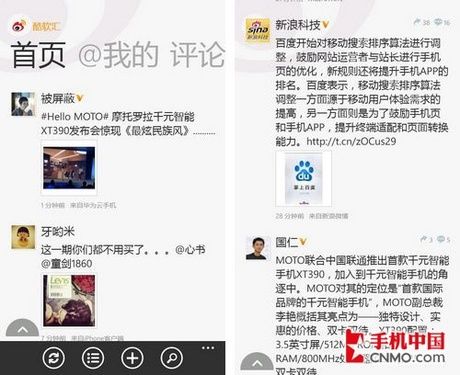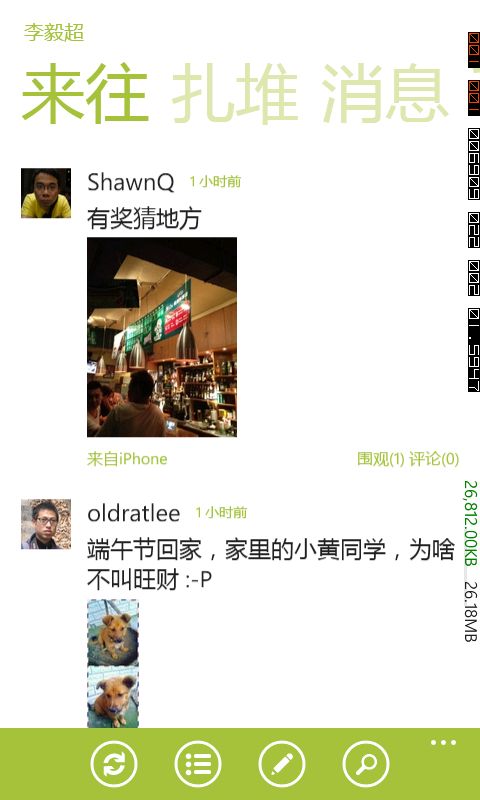【WP开发】实现Pivot控件单个PivotItem的全屏化
在新浪微博WP7版中有一个蛮酷的特效,就是滑动list的时候直接全屏化界面。
一直想实现这个特效,最终还是类似的实现了这个特效。
对于ApplicationBar还是很好解决的,直接对IsVisible属性设置为false就能实现,而对上面的Header进行进行隐藏就可以了,经过一番实验貌似用Margin设为负数就能够解决。
好接下去看代码:
首先是布局文件。
<controls:Pivot x:Name="FeaturePivot" Title="{Binding Title}" Foreground="{StaticResource PhoneAccentBrush}">
<controls:PivotItem x:Name="StoryPivotItem">
<controls:PivotItem.Header>
<TextBlock Text="{Binding Storys.Title}" FontSize="64" VerticalAlignment="Center" HorizontalAlignment="Center" Margin="0,10,0,0" Foreground="{StaticResource PhoneAccentBrush}"></TextBlock>
</controls:PivotItem.Header>
<lw:StoryList x:Name="HomeTimeLine" DataContext="{Binding Storys}" />
</controls:PivotItem>
</controls:Pivot>
这里的lw:StoryList是一个UserControl,里面是一个List和ListItem的模版文本,这里不用去管它。但后面它困扰了我很久。
好,由于这是扩展的交互方式,我们可以不用严格的把BackCode写在ViewModel里,我们就直接写在xaml.cs里就行了。
void FullScreenAction()
{
if (this.ApplicationBar.IsVisible == false)
return;
this.FeaturePivot.Margin = new Thickness(0, -158, 0, 0);
this.GlobalProgressBar.Margin = new Thickness(0);
this.ApplicationBar.IsVisible = false;
this.BackKeyPress += OnFullScreenBackKeyPress;
}
void StopFullScreenAction()
{
if (this.ApplicationBar.IsVisible == true)
return;
this.GlobalProgressBar.Margin = new Thickness(80, 32, 120, 0);
this.ApplicationBar.IsVisible = true;
this.FeaturePivot.Margin = new Thickness(0);
this.BackKeyPress -= OnFullScreenBackKeyPress;
}
private void OnFullScreenBackKeyPress(object sender, System.ComponentModel.CancelEventArgs e)
{
StopFullScreenAction();
e.Cancel = true;
}
这是最挫的实现方式,直接this.FeaturePivot.Margin = new Thickness(0, -158, 0, 0);设置Margin为负值,能达到全屏的效果,但直接隐藏header用户体验很不好。并且这个时候还是能够左右滑动
PS:这里需要注意按后退键是能够退出全屏的,并在退出时清空BackKeyPress这个Event,防止阻碍用户正常退出App。
事情一件一件来,先解决左右滑动的问题。toolkit中有一个控件叫lockablePivot,在这里它就可以用了。
将上面的xml代码中的controls:Pivot替换成toolkit:LockablePivot,其他不用变,在backcode中再放入一些代码:
void FullScreenAction()
{
if (this.ApplicationBar.IsVisible == false)
return;
this.FeaturePivot.Margin = new Thickness(0, -158, 0, 0);
this.GlobalProgressBar.Margin = new Thickness(0);
this.ApplicationBar.IsVisible = false;
this.FeaturePivot.IsLocked = true; //added code
this.BackKeyPress += OnFullScreenBackKeyPress;
}
void StopFullScreenAction()
{
if (this.ApplicationBar.IsVisible == true)
return;
this.GlobalProgressBar.Margin = new Thickness(80, 32, 120, 0);
this.ApplicationBar.IsVisible = true;
this.FeaturePivot.Margin = new Thickness(0);
this.FeaturePivot.IsLocked = false; //added code
this.BackKeyPress -= OnFullScreenBackKeyPress;
}
private void OnFullScreenBackKeyPress(object sender, System.ComponentModel.CancelEventArgs e)
{
StopFullScreenAction();
e.Cancel = true;
}
只是增加this.FeaturePivot.IsLocked的定值操作就能完美的解决全屏时能滑动的现象。
接下来,貌似得加点动画才感觉有较好的用户体验,好,继续,我们会对上面的代码继续优化。
到加动画的时候又犯难了,尼玛查文档发现Storyboard根本不支持Margin属性的DoubleAnimation类型的动画,因为Margin在SL中被定义成一个Object,而DoubleAnimation只能对数值类进行补间动画。
不过还是有方案的,就是用RenderTransform下的CompositeTransform的Translate系列属性。
直接看代码。
<phone:PhoneApplicationPage.Resources>
<Storyboard x:Name="TitleDispear">
<DoubleAnimation Duration="0:0:1" To="-158" Storyboard.TargetProperty="(UIElement.RenderTransform).(CompositeTransform.TranslateY)"
Storyboard.TargetName="FeaturePivot" d:IsOptimized="True">
<DoubleAnimation.EasingFunction>
<CubicEase EasingMode="EaseOut" />
</DoubleAnimation.EasingFunction>
</DoubleAnimation>
</Storyboard>
<Storyboard x:Name="TitleAppear">
<DoubleAnimation Duration="0:0:1" To="0" Storyboard.TargetProperty="(UIElement.RenderTransform).(CompositeTransform.TranslateY)"
Storyboard.TargetName="FeaturePivot" d:IsOptimized="True">
<DoubleAnimation.EasingFunction>
<CubicEase EasingMode="EaseOut" />
</DoubleAnimation.EasingFunction>
</DoubleAnimation>
</Storyboard>
</phone:PhoneApplicationPage.Resources>
<!---------------code---------------->
<toolkit:LockablePivot x:Name="FeaturePivot" Title="{Binding Title}" Foreground="{StaticResource PhoneAccentBrush}">
<toolkit:LockablePivot.RenderTransform>
<CompositeTransform />
</toolkit:LockablePivot.RenderTransform>
<i:Interaction.Triggers>
<i:EventTrigger EventName="SelectionChanged">
<cmd:EventToCommand Command="{Binding ChangeSelectionCommand}" CommandParameter="{Binding ElementName=FeaturePivot}" />
</i:EventTrigger>
</i:Interaction.Triggers>
<controls:PivotItem x:Name="StoryPivotItem">
<controls:PivotItem.RenderTransform>
<CompositeTransform />
</controls:PivotItem.RenderTransform>
<controls:PivotItem.Header>
<TextBlock Text="{Binding Storys.Title}" FontSize="64" VerticalAlignment="Center" HorizontalAlignment="Center" Margin="0,10,0,0" Foreground="{StaticResource PhoneAccentBrush}"></TextBlock>
</controls:PivotItem.Header>
<lw:StoryList x:Name="HomeTimeLine" DataContext="{Binding Storys}" />
</controls:PivotItem>
<!------------code--------------->
</toolkit:LockablePivot>
在上面的XML文件中定义了两个Storyboard动画资源,全屏化时让FeaturePivot的TranslateY由0->-158,向上溢出,这样就是实现了header的隐藏,所以TranslateY和margin都是可以隐藏header的,但有一点很大的不同,
TranslateY不会改变UIElement的大小,而Margin会改变,负数等于是拉伸大小。于是这里问题就产生了,如果光设置TranslateY会导致整个Pivot下方有一部分空白区域。。。所以要着手解决这个问题,也就是这个问题困然了我很久。。。。
看backcode代码:
void FullScreenAction()
{
if (this.ApplicationBar.IsVisible == false)
return;
this.FeaturePivot.Margin = new Thickness(0, 0, 0, -158);
this.GlobalProgressBar.Margin = new Thickness(0);
TitleDispear.Begin();
this.ApplicationBar.IsVisible = false;
this.FeaturePivot.IsLocked = true;
this.BackKeyPress += OnFullScreenBackKeyPress;
}
void StopFullScreenAction()
{
if (this.ApplicationBar.IsVisible == true)
return;
this.GlobalProgressBar.Margin = new Thickness(80, 32, 120, 0);
this.ApplicationBar.IsVisible = true;
TitleAppear.Begin();
this.FeaturePivot.Margin = new Thickness(0);
this.FeaturePivot.IsLocked = false;
this.BackKeyPress -= OnFullScreenBackKeyPress;
} //code
这里我们再start时先对Pivot的Margin的bottom设置为-158,用户这时候其实是感知不到pivot的大小变化的,因为溢出的看不到,接下来在进行动画的begin操作。就能完美的实现全屏模式了。
慢着,如何触发全屏这个动作呢,新浪是这么做的:用户快速下滑List的时候会开启,而上拉时关闭。接下来得加上手势。
我们要用到toolkit中的GestureService行为了。
前端代码:
<controls:PivotItem x:Name="StoryPivotItem">
<controls:PivotItem.RenderTransform>
<CompositeTransform />
</controls:PivotItem.RenderTransform>
<controls:PivotItem.Header>
<TextBlock Text="{Binding Storys.Title}" FontSize="64" VerticalAlignment="Center" HorizontalAlignment="Center" Margin="0,10,0,0" Foreground="{StaticResource PhoneAccentBrush}"></TextBlock>
</controls:PivotItem.Header>
<!-- 增加下面的语句 -->
<toolkit:GestureService.GestureListener>
<toolkit:GestureListener Flick="OnStoryGestureListenerFlick"/>
</toolkit:GestureService.GestureListener>
<!-- END -->
<lw:StoryList x:Name="HomeTimeLine" DataContext="{Binding Storys}" />
</controls:PivotItem>
BackCode:
private void OnStoryGestureListenerFlick(object sender, FlickGestureEventArgs e)
{
if (SettingsHelper.GetFullScreenMode() == "0")
return;
if (e.Direction == System.Windows.Controls.Orientation.Horizontal) //判断手势方向
return;
//if (e.Angle < 260 || e.Angle > 280) //角度判断,可以不用
// return;
if (e.VerticalVelocity < 0) //垂直速度判断
{
FullScreenAction();
}
else
{
StopFullScreenAction();
}
}
在前端中加入上面的语句来声明一个手势bind,在backcode中进行ActionBind,SettingsHelper.GetFullScreenMode()是设置信息,默认是开启的。
其他的看注释。
好,这样就差不多实现了新浪微博类似的全屏模式。。。出个效果图(顺便宣传一下来往~~,哇咔咔)
普通界面:
换肤加全屏界面:
Hummm,尼玛还是全屏神马的才能看得更多嘛!!


